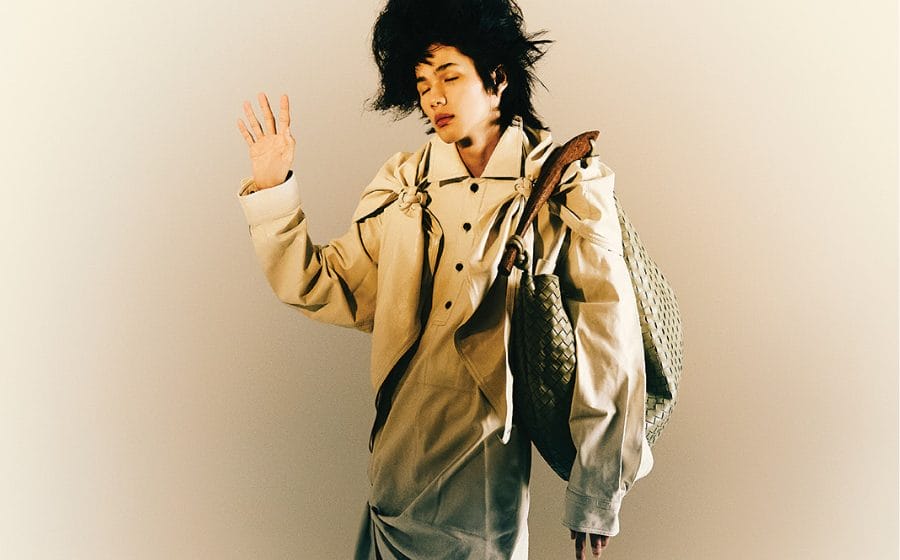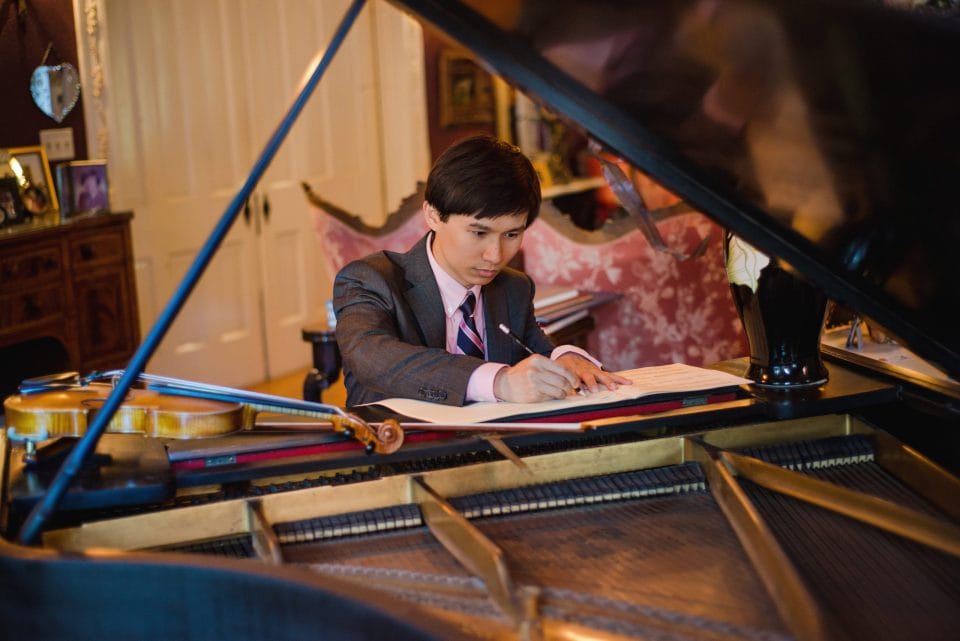
Since developing a more nuanced understanding of our national identity over the years, Singapore’s creative expression has become more refined and resonant with our unique story, with the things we choose to say coming more naturally and with conviction. Especially in the audio sphere, thanks to compelling voices like Chen Zhangyi — a prolific composer whose works celebrate everything from nature, global cultures and Singapore’s unique culture, allowing our music scene to grow more dynamically and in multifold.
On top of being a professor at the Yong Siew Toh Conservatory of Music, a conductor, violinist and violist, Chen composes works for almost all of the instrument families you can imagine. From solos to orchestras, string quartets, operas, to East-West collaborations that involve traditional Chinese instruments, Chen adopts the language of each instrument with ease and gusto, all while responding to text or paintings, evoking thought about climate change or waxing lyrical about the love of food. He has also collaborated with numerous orchestras from all over the world, fusing his love for Singaporean culture with acute sensitivity to tenderness and sincerity.
We catch up with him ahead of his latest project with T’ang Quartet’s 30th Anniversary concert, one of Asia’s most accomplished and critically-acclaimed string quartets, to talk about his journey through life in music, the art of composition, and how to muster the courage to trust one’s own voice.
Could you describe what you do for a living in 10 words or less?
I’m a composer, music educator, and (sometimes) play the violin/viola.
How did you first fall in love with music?
I remember that when I was a teenager, I used to spend many afternoons playing the violin, reading all the music books I could find from the library, and listening to all sorts of music that I could find, and I thought what a magical world to be immersed in music. I also joined the choir and string ensemble, and then the youth orchestra.
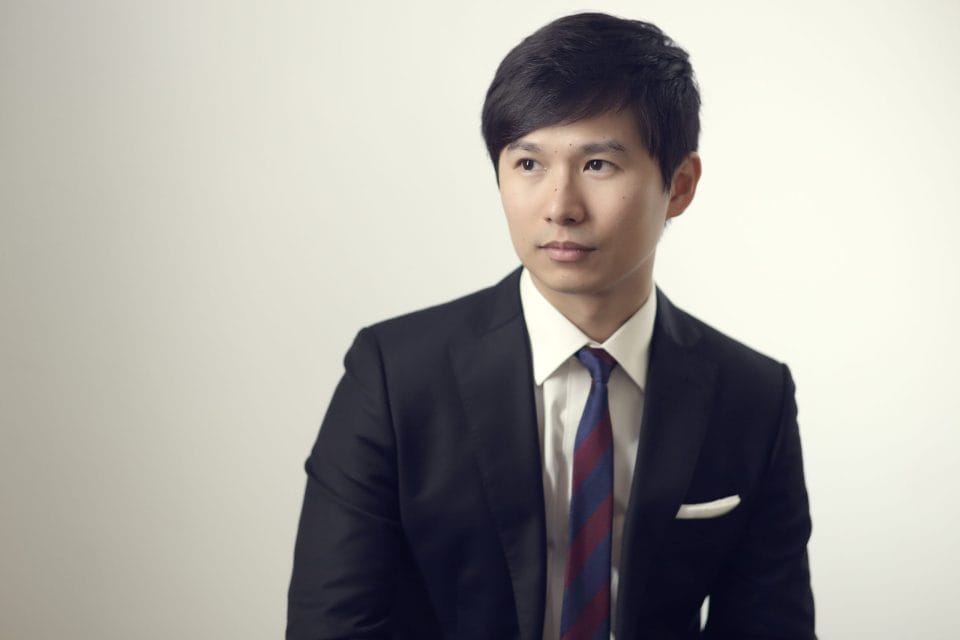 How did you decide to do music full-time?
How did you decide to do music full-time?
After high school, I thought that I have to go study music abroad, but when YST was established it became the obvious choice for college. Studying as a composer, I kept on playing violin in orchestras, ensembles, (and wedding gigs!) until I eventually picked up the viola. The mix of different musical activities made it fun for me, and it also became viable to pursue music as a career.
Did you have a particular moment that made you realise you wanted to do this for the rest of your life? Or was it natural and gradual?
You know when I was 10 years old, I told a reporter that I was going to be an artist, because at that time I had just won an art award with a Chinese Ink Painting titled ‘Chrysanthemum Blossoms’. I guess that it wasn’t untrue, except that my focus switched from visual arts to the musical arts, and one thing led to another.
How did that lead to a focus in composition?
Although I love performing (not that I’m good at it), I liked to imagine new melodies in my head, and loved to play around on the piano or violin. I was also always fascinated with harmony, counterpoint, textures of the music I heard. In a way, composing brought about many opportunities, and it went from making arrangements to volunteering to compose for some of these ensembles that I was part of, and eventually a first commission.
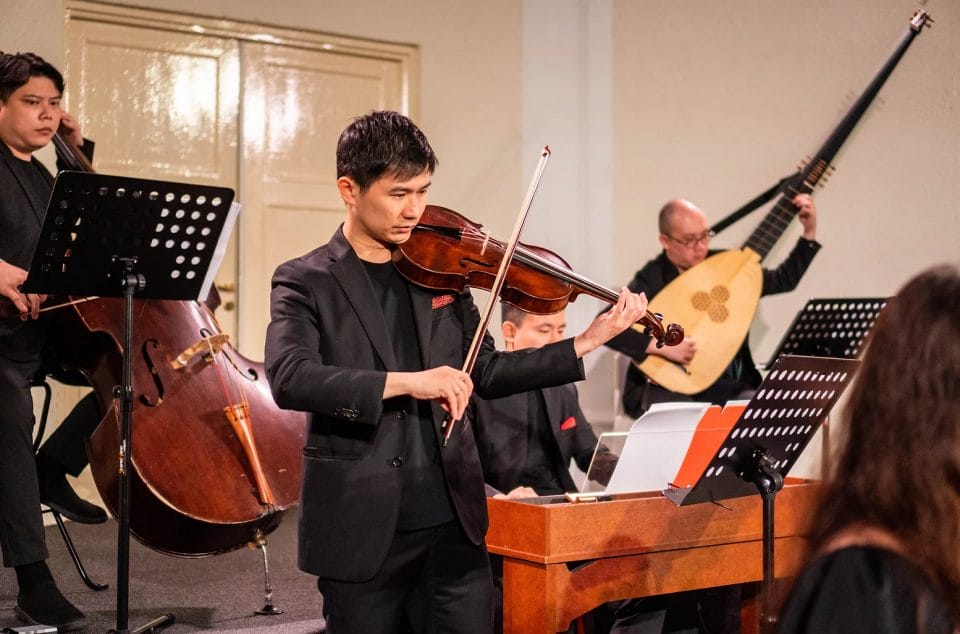 As you create for a wide variety of instruments that span everything from violin, voice, percussion, to even traditional Chinese instruments, I’m curious to know what your creative process looks like. How does a composition typically start and how far do you have to go to understand an instrument before creating works for it?
As you create for a wide variety of instruments that span everything from violin, voice, percussion, to even traditional Chinese instruments, I’m curious to know what your creative process looks like. How does a composition typically start and how far do you have to go to understand an instrument before creating works for it?
Oh, it’s a lot of fun writing for different idioms and ensembles! There’s also a bit of research on what other is music out there, so I try to create something that is unique and personal.
When I write for instruments, I would first do some research, and try to get to a stage where I can imagine vividly what the instrument can do. If it’s for strings, I would have my violin and viola lying around so that I can try out certain sounds, techniques, and fingering patterns. I also like to fiddle around with instruments that I don’t know like the zhongruan, guzheng, or percussion instruments, when I have to write for them.
When I’m working on a chamber opera, collaborating with the librettist and producers to develop the story is a crucial part of getting it started, before we can get to set the music to bring those narratives and characters to life.
What inspires your work?
Other forms of art, like visual arts, poetry, and of course, nature, Asian cultures, Singaporean culture, and life. Also other music, and the performers whom I’m writing for.
I notice there are a lot of nature-themed compositions, but there are also a lot of pieces that reflect Singaporean life and culture. How do you transpose ideas inspired by everyday life into music?
That’s the beauty of it — everyone’s response would be different. When I respond to a piece of painting or have an idea, I use my own set of skills, and preferences to create something. And I’m always looking for the next thing that has not been written into music yet; it was the National flower ‘Vanda’, ‘Kampung Spirit’ and then the Singaporean poetic form ‘Twin Cinema’. Music is so specific, but it can also be totally abstract and personal.
How then did Give and Take (Back and Forth) for the collaboration with T’ang Quartet for their 30th anniversary finale concert come to be?
The T’ang quartet wanted to mark their 30th anniversary with a new Singaporean work, so I am very lucky to be asked to write for them. It really is a dream come true, as I have grown up hearing them.
Since I’ve caught you in the middle of preparing for this piece, what did you want to express with this work and what has been the biggest challenge composing this so far?
I was re-reading Vikram Seth’s An Equal Music to get some inspiration, as well as get myself acquainted with the world of being in a quartet. The thing with quartet playing is that every single person plays an equal part, and there has to be so much rapport, intuition, and a sense of trust to sound good as a quartet! So like a four-way relationship, I thought it was like a marriage, where we have to ‘give and take’. The back and forth, is a reference to YST’s 20th anniversary, with a theme of ‘looking back, but moving forward’!
The challenge is of course to write a good enough piece for this daunting idiom, that hopefully will stay in the repertoire.
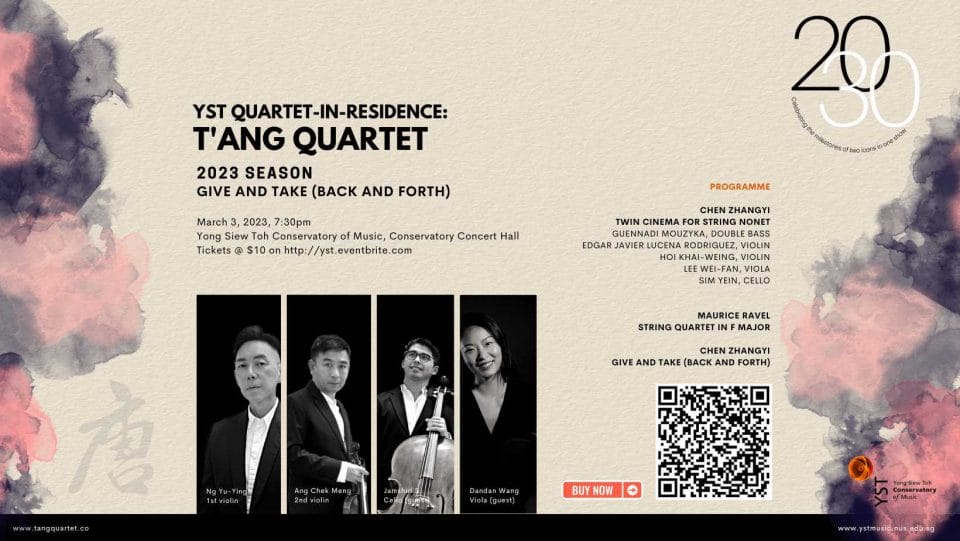
What kind of advice would you give to someone looking to follow in your footsteps? Perhaps someone who also wants to have a distinct voice, but now has even wider access to cultures and music from around the world?
Just keep going, and with lots of determination and hard work, you’ll get better at it.
Yes, one has to be so aware of what’s out there in the world, but you also have to remember that only by looking inward will you find and understand what truly draws you in and moves you artistically.
Lastly, what would your ideal music landscape be like in Singapore after a decade?
A place that is more vibrant and has a healthier ecosystem, where musicians collaborate even more closely with living composers, and interact with audiences and young people (and vice versa). I also hope that we can have more ‘give and take’ with regard to arts philanthropy and music education, so that in the long run, it could be sustainable for all.
Once you’re done with this story, click here to catch up with our February 2023 issue.


